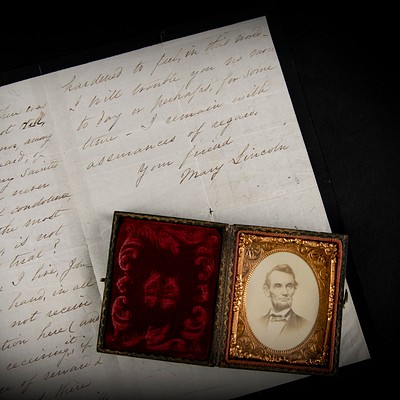Theodore Roosevelt Handwritten Manuscript
Two ways to bid:
- Leave a max absentee bid and the platform will bid on your behalf up to your maximum bid during the live auction.
- Bid live during the auction and your bids will be submitted real-time to the auctioneer.
Bid Increments
| Price | Bid Increment |
|---|---|
| $0 | $5 |
| $50 | $10 |
| $200 | $25 |
| $500 | $50 |
About Auction
Feb 8, 2023
RR Auction support@rrauction.com
- Lot Description
Handwritten manuscript by Theodore Roosevelt from his original draft for the four-volume The Winning of the West, one page, 8 x 12.5, no date but first published in 1889. This text, offering Roosevelt's observations on frontier justice amongst Native American Indian tribes, would be published as part of Volume I, Chapter IV: The Algonquins of the Northwest, 1769-1774. Roosevelt writes, in part: "Each race stood by its own members, and each held all of the other race responsible for the misdeeds of a few uncontrollable spirits; and this clannishness among those of one color, and the refusal or the inability to discriminate between the good and the bad of the other color were the two most fruitful causes of border strife. [Footnote: It is precisely the same at the present day. I have known a party of Sioux to steal the horses of a buffalo hunting outfit; and the latter retaliated by stealing the horses of a party of harmless Grosventres: and I knew a party of Cheyennes, whose horses had been taken by white thieves, to, in revenge, assail a camp of perfectly orderly cowboys. Most of the ranchmen along the Little Missouri in 1884 were pretty good fellows, who would not wrong Indians, yet they tolerated for a long time the presence of men who did not scruple to boast that they stole horses from the latter; while our peaceful neighbors, the Grosventres, likewise permitted two notorious redskinned horse thieves to use their reservation as a harbor of refuge, and the starting point from which to make forays against the cattlemen.]
When, even if he sought to prevent them, the innocent man was sure to suffer for the misdeeds of the guilty, unless both joined together for defence, the former had no alternative save to make common cause with the latter. Moreover, in a sparse backwoods settlement, where the presence of a strong, vigorous fighter was a source of safety to the whole community, it was impossible to expect that he would be punished with severity for offences which, in their hearts, his fellow townsmen could not help regarding as in some sort a revenge for the injuries they had themselves suffered. Every quiet, peaceable settler had either himself been grievously wronged, or had been an eyewitness to wrongs done to his friends; and while these were vivid in his mind, the corresponding wrongs done the Indians were never brought home." In fine condition, with light soiling.
But for minor grammatical changes—and some struck-through emendations and revisions made to this text—this manuscript page represents the published text from Roosevelt's monumental history of the American West. Roosevelt was a prolific author and, in fact, had first come to prominence as a serious historian with the two-volume work The Naval War of 1812. He turned to writing The Winning of the West, his most ambitious work, after suffering defeat in the 1886 election for mayor of New York City. Tracing the history of American westward expansion, it was first published in four volumes by G. P. Putnam's Sons between 1889 and 1896. - Shipping Info
-
Bidder is liable for shipping and handling and providing accurate information as to shipping or delivery locations and arranging for such. RR Auction is unable to combine purchases from other auctions or affiliates into one package for shipping purposes. Lots won will be shipped in a commercially reasonable time after payment in good funds for the merchandise and the shipping fees are received or credit extended, except when third-party shipment occurs. Bidder agrees that service and handling charges related to shipping items which are not pre-paid may be charged to a credit card on file with RR Auction. Successful international Bidders shall provide written shipping instructions, including specified Customs declarations, to RR Auction for any lots to be delivered outside of the United States. NOTE: Declaration value shall be the item’(s) hammer price and RR Auction shall use the correct harmonized code for the lot. Domestic Bidders on lots designated for third-party shipment must designate the common carrier, accept risk of loss, and prepay shipping costs.
-
- Buyer's Premium



 EUR
EUR CAD
CAD AUD
AUD GBP
GBP MXN
MXN HKD
HKD CNY
CNY MYR
MYR SEK
SEK SGD
SGD CHF
CHF THB
THB












